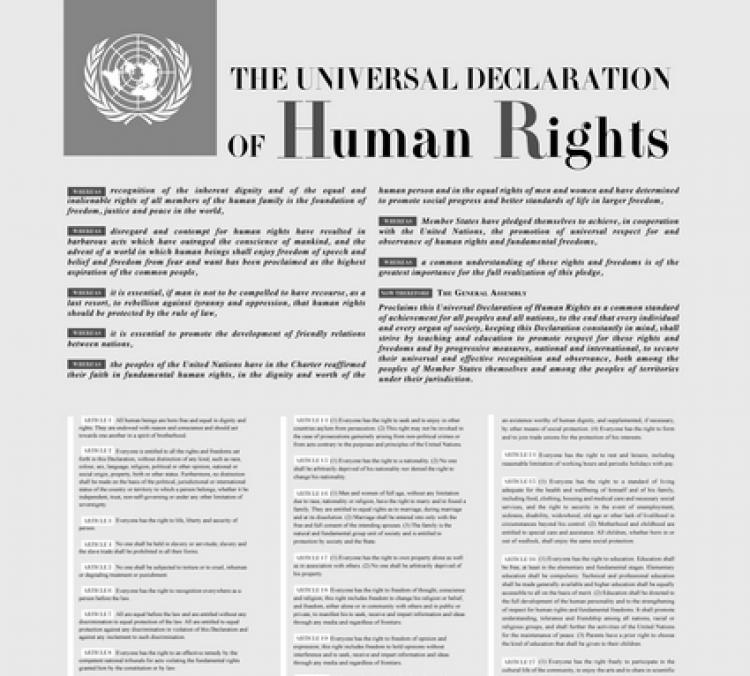#Happy Human Rights Day – 70 years on
On the 10th of December 1948, the Universal Declaration of Human Rights was established by the UN. It consists of 30 articles describing civil, political, cultural, economic and social rights that all human beings should enjoy. Still, a recent report from the organisation Article 19 states that the global state of freedom of expression, a pre-requisite for a free society, is at its lowest point in ten years.
For more than 10 years, ICORN has offered refuge to more than 200 writers and artists who are persecuted for speaking up against human rights violations and for the protection of freedom of expression. In safety, they can continue their work as change actors for democracy and freedom in their home countries and create awareness internationally.
ICORN marked the 70 years anniversary of the declaration at the ICORN General Assembly in Malmø in May, when Birgit Van Hout, UN High Commissioner for Human Rights Europe Representative for Europe, made a statement to the assembly and encouraged us all to reinforce the message of the continued relevance of human rights as a universal standard, whereas keynote speaker Mike van Graan asked the questions directly confronting the convention: Who’s human? Who’s right?
We asked some of the writers and artists and people working with the ICORN programme to reflect on the importance of freedom of expression in their lives and connected to experiences of being bereft of it.
Supriti Dhar
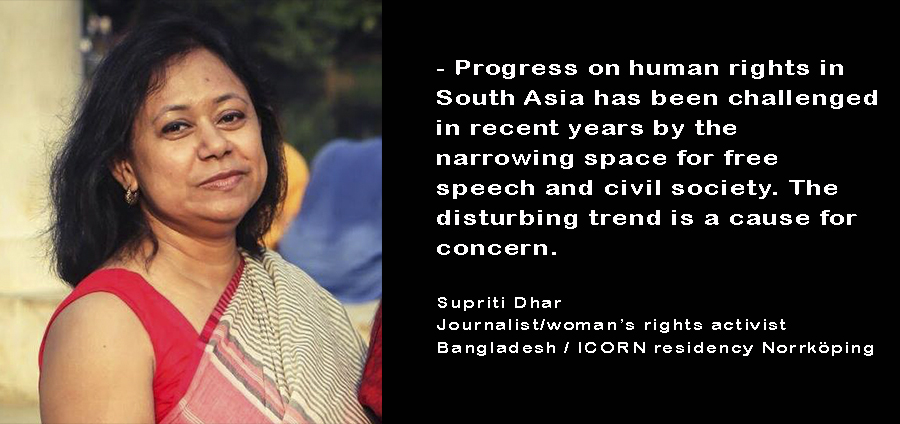
Bangladeshi journalist and women rights activist, Supriti Dhar, has been harrassed and threatened because of her outspoken criticism of partriarchal structures and women's inferior position in traditional Bangladeshi society, and for her efforts to empower women. She arrived in Norrköping with the ICORN programme in May this year and will stay and work for two years.
- In a democratic country, the word 'freedom of expression' is much more important for all it's citizens. Unfortunately, these rights have been curtailed for many ways, especially in South Asian countries like Bangladesh, India and Pakistan. In these countries people are being harassed, tortured, kidnapped, disappeared or even killed for their rights of speech.
I am from Bangladesh and have been working as a journalist for 21 years. Currently I am living in Sweden only because I wanted to work freely which I couldn't do in my country. I know what embedded journalism is nowadays and what is the impact on the society. A civilisation cannot exist without freedom and this absence violates the human rights overall.
Progress on human rights in South Asia has been challenged in recent years by the narrowing space for free speech and civil society. The disturbing trend is a cause for concern.
I would say that I am worried about countries where people are pushed away, arrested or even worse for their rights. These so-called "shrinking spaces" are a tendency all over the world right now. Opinions have a right to be heard, to be expressed and the right to be protected.
Bangladesh already suffers poor standards when respecting freedom of expression, and a newly enacted law known as the Digital Security Act 2018 is enough to suppress political dissent and free speech using brutal means.
This law already has shown its black faces by establishing “digital offences,” and by practising power for police to investigate such offences. General people like us are so helpless in front of such devil law.
Nazeeha Saed
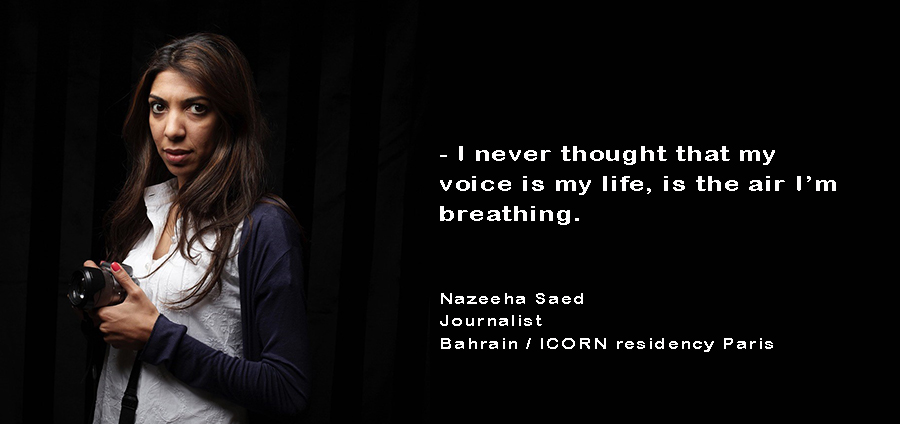
Journalist and international correspondent Nazeeha Saeed was the first reporter to challenge the human rights abuses of the Bahraini government through the legal system after its harsh crack-down on protesters in 2011. Facing continuous harassment, Saeed left Bahrain shortly after they lifted her travel ban and is now ICORN writer-in-residence in Paris City of refuge.
- I never thought that my voice is my life, is the air I’m breathing. When I can’t express my opinion and my feelings, I feel that I can’t live any more. There is a deep feeling of injustice when someone or some authority ban me from being who I am, having at least freedom of expression, and that feeling of injustice is painful. I hope we reach one day that no-one will feel this way, and we are all free to express ourselves and respect others to do so.
Chris Gribble
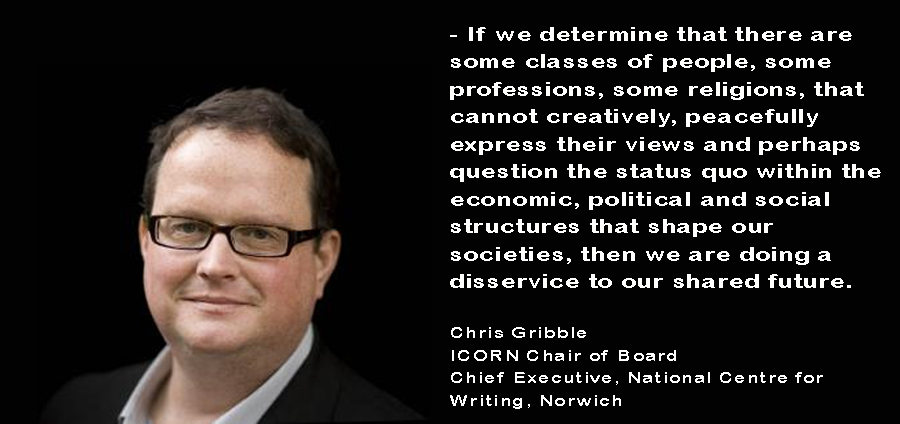
Chief Executive of the National Centre for Writing in Norwhich, which was one of the founding members of ICORN, Chris Gribble has been an active participant in the network since the start; he was a member of the original advisory Board, he served as boad member of the ICORN Board of Directors for two full terms, and was elected Chair of the ICORN Board at the 2016 ICORN General Assembly in Paris.
- As well as being a grand ideal and a prerequisite for equality, the idea of freedom of expression is for me rooted most strongly in an every-day, civic and social context as a practice and need as urgent almost as the need to breathe. If we determine that there are some classes of people, some professions, some religions, that cannot creatively, peacefully express their views and perhaps question the status quo within the economic, political and social structures that shape our societies, then we are doing a disservice to our shared future. ICORN offers places of safety, practical help and hope to some of those writers and artists - often the first victims of the urge to repress freedom of expression - and this is why I am passionate about its vision and mission.
Umar Abdul Nasser
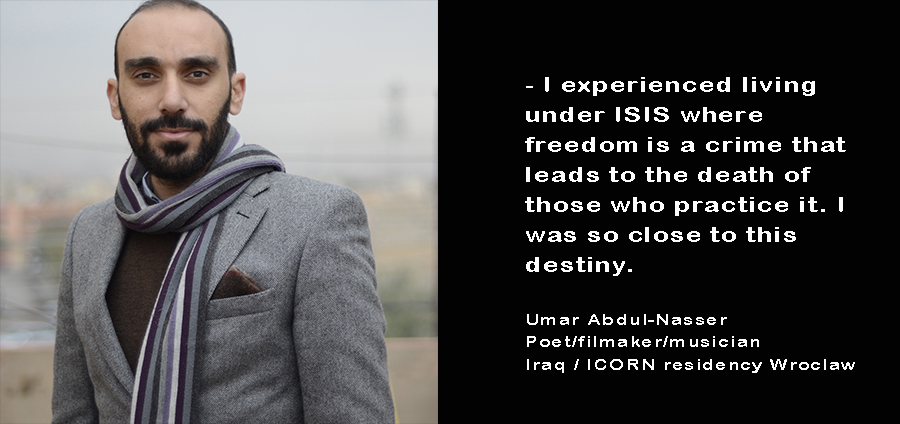
Iraqi poet and musician Umar Abdul-Nasser lived in hiding from IS for more than two years before he managed to leave the country for an ICORN residency in Wroclaw in 2016. The work of Umar and his fellow musicians was deemed by IS to be incompatible with Islamic Law. His poetry reflects on the topics of peace and freedom. Here is an extract form one of his poems.
My freedom is the greatest truth
My freedom is the most truthful truth
There is no fact that I could accept without it
There is no fact that could exist without it
If its light will not confirm my existence, who would I be
And who would I be,
If the words of my life don’t equal the life of my words?
Małgorzata Różańska-Mglej
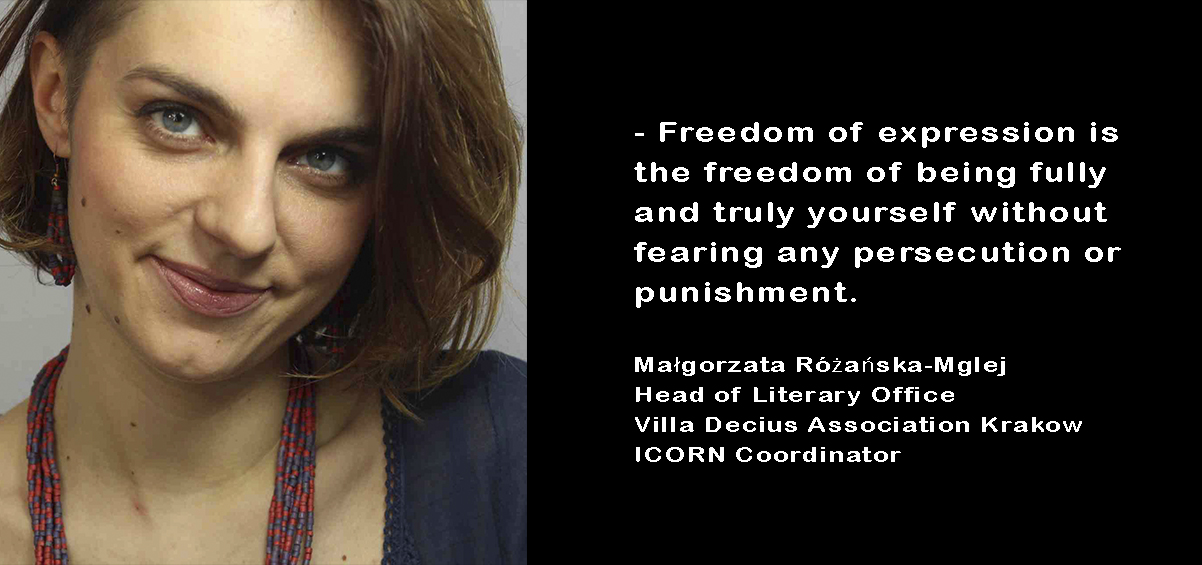 Małgorzata Różańska-Mglej is the ICORN coordinator and Head of Literary Office at the Villa Decius Association, which manages the ICORN programme in Krakow City of Refuge.
Małgorzata Różańska-Mglej is the ICORN coordinator and Head of Literary Office at the Villa Decius Association, which manages the ICORN programme in Krakow City of Refuge.
- For me freedom of expression is the freedom of being fully and truly yourself without fearing any persecution or punishment. Freedom to be whoever you want to be, act however you want to act and choose whatever you want to choose. For me freedom’s only limit is the freedom of the others.
Sahar Mousa
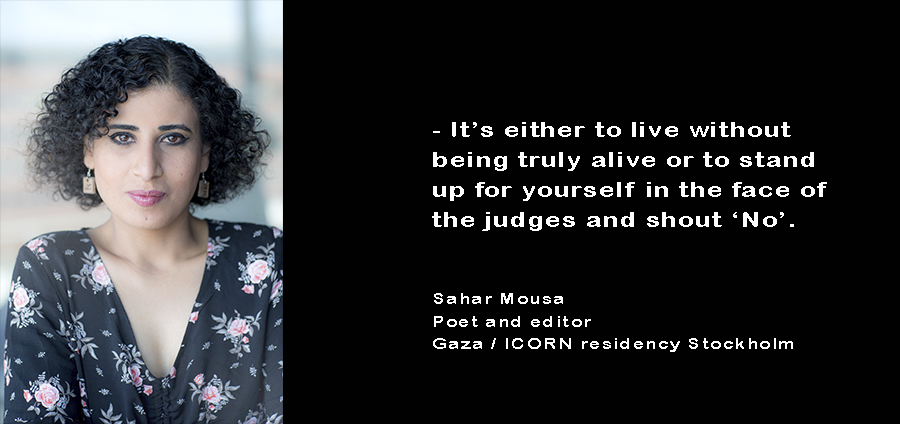
Sahar Mousa fled Gaza after death threats from IS, and was offered two years ICORN residency in Stockholm in May 2018 where she continues to work. She is a poet, writer and magazine editor. In her writing, Mousa tackles many issues, including war, political polarisation, and social injustice in Palestinian society, as well as the general human condition from a feminine perspective.
- Imagine that you are invited to a big ceremony, you are fourteen now and in the eyes of your people you are no longer a child girl! This ceremony is all about declaring you as a woman, and the basic ritual of it goes like this: a group of male judges announce that a little piece of your body should be cut away, and through time many other pieces will be taken as well. Basically, every time you attempt to speak out loud, or identify yourself through your thoughts or your art, and every time you raise your objection to the injustice that you are facing.
In real life it’s not just a piece of your body, but a piece of your humanity and your existence, the core of your identity that distinguish you from other beings, the part that makes you what you are, your mindset, sexuality, creativity and uniqueness.
I have worked as a writer in Gaza, and doing what I do in such a conflicted society make me feel on a daily basis that I am in a risk of losing an intimate part of myself, but in fact I didn’t have a lot of choices - it’s either to live without being truly alive or to stand up for yourself in the face of the judges and shout “No”.
Tesfagiorgis Habte
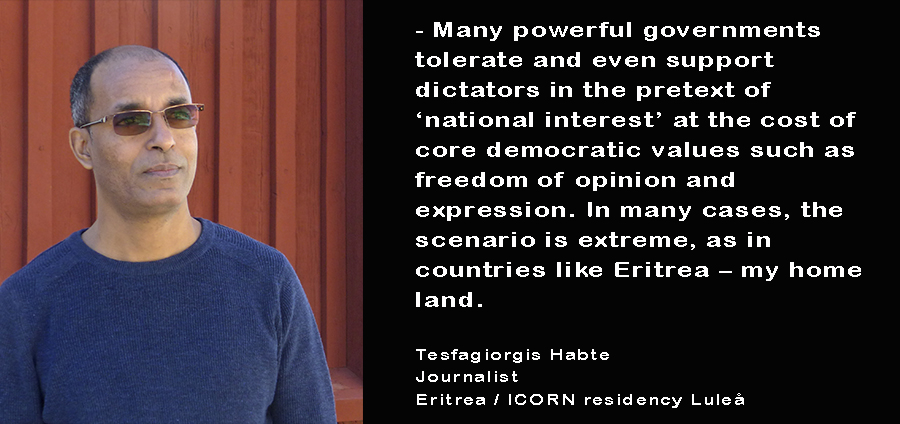
Tesfagiorgis Habte Kelati is an Eritrean journalist and author. During a period of repression when the radio station Habte worked at was subjected to a raid, Tesfagiorgis was taken from his office and detained by the military on the 19th of February 2009. He remained in captivity without facing formal charges for four years. After his release on March 19, 2013, he left the country. He came to the city of Luleå in April 2017, where he continues to work.
Freedom of opinion and expression. IT's a birth right, not a charity. With end of the cold war by the end of the 20th century, I had the ambition of seeing a freer world where its population live in peace and harmony - a more democratic world where dictators and their instruments of oppression would never be tolerated and be history with the turn of that century. I was still a teenager. However, I learned lately that my young heart had a naïve judgment.
It did not take much time for things to fall apart in many parts of the world. Dictators started to bloom. We have seen many powerful governments tolerate and even support dictators in the pretext of ‘national interest’ at the cost of the core democratic values such as freedom of opinion and expression. Let alone journalists and media, even ordinary citizens have been subjected to incredible tortures and crimes for the sole reason of expressing their opinions.In many cases, the scenario is extreme in countries like Eritrea – my home land.
Let me give you a phenomenal example, which someone told me: A young man was put in a high-security military prison in a small concrete prison cell for a year. No one had approached him since he was imprisoned. After a year, the security person discovered that there was this young man who had never been interrogated and they could not find a responsible person who ordered his imprisonment. Then they decided, ¨We’ll release you only if you agree and sign a document that you scolded the president while you were drinking in a bar.¨ The man refused their proposal stating that he had never drunk full and that he had never scolded the president. He told them that he better stayed in the prison rather than signing a false testimony. Fortunately, he was released a week after. To such extent is the freedom of expression endangered and degraded.
There have been so many people who have been punished for crimes they have never committed. Many of them are even imprisoned illegally for ‘thinking against the government’ let alone express their opinions. Unfortunately, I am one of those many people who had been the victims of such heinous measures. I see now that the denial of the right of free expression and opinion is very rampant practice.
Whenever the issue of freedom of expression raises, I always wonder about what would happen to humanity if it had no the means of communication it has today in terms of verbal and written systems it had developed. Would we have the civilization we have today? Would we be able to survive as species, i.e., as homo sapiens in the first place? How would all the knowledge and experiences our past generations gained pass to the next? The questions are infinite indeed. However, the answer is one: we would never be us as we are today as distinct homo sapiens, which is different from the other animal species.
I believe that expressing yourself in what so ever form you like (opinions, ideas, expressions, etc) without no one telling what to say and receiving information from others through whatever type of media you prefer are one’s birth rights. That being the truth, I wonder about how on earth do others deny these rights.
When a child is born, one of the biggest tasks of the mother in particular, the family and community in general, is training the child with communication skills, particularly speaking.
Being equipped with the skills of communication is not only a choice but a necessity. Speaking is one of the core elements of communication. Hence, enabling the child to speak from the very beginning is vital because that is one of life’s essential skills to be able to survive and function in its society properly. Otherwise, the child would be inhibited. That is how I see the freedom of expression. Without the freedom of opinion and expression, humanity is at danger even for its own existence.
Without the freedom of opinion and expression, humanity is at danger even for its own existence. Nothing is for granted in our fragile world these days. However, I do appreciate those countries and societies, which have been working hard relentlessly to safeguard this right and just wish others to follow their track.
Latest news
-
18.04.24
-
04.04.24
-
26.03.24
-
21.03.24
-
08.03.24
